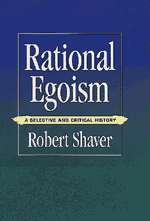2 - The instrumental theory
Published online by Cambridge University Press: 05 November 2011
Summary
It might seem misguided to consider the instrumental theory in a work on rational egoism – apart, at least, from any role the theory plays in the exegesis of Hobbes. For combining an instrumental account of rationality with the denial of psychological egoism allows the possibility that one might act rationally against one's self-interest, and so makes room for morality in a way that rational egoism does not. The instrumental theory, however, is not really a friend of morality. For it makes rational sacrifice, though not impossible, often unlikely. Sacrifice will fail to be rational whenever my interests – both self- and other-regarding – happen not to be best served by it. In this the instrumental theory resembles rational egoism: Both make the rationality of obeying moral demands contingent on features of the agent that are often absent. It is worth, then, asking whether Hobbes missed good arguments for the instrumental theory.
There is a further reason for considering the instrumental theory: given the falsity of psychological egoism, it is, as noted, inconsistent with rational egoism. One might, then, attack rational egoism by supporting the instrumental theory. I shall focus on the instrumental theory as an egoist-like threat to morality, but it is worth keeping in mind that rational egoism is also threatened.
- Type
- Chapter
- Information
- Rational EgoismA Selective and Critical History, pp. 39 - 58Publisher: Cambridge University PressPrint publication year: 1998



